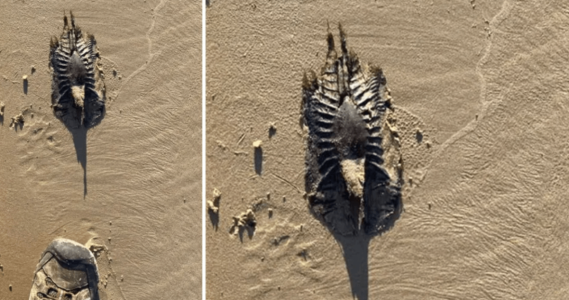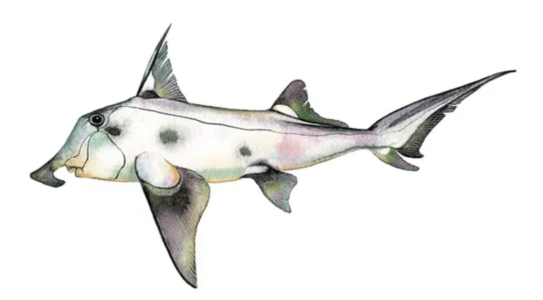Mysterious ‘alien’ creature found on beachside sparks urgent call for coastal discoveries
- Replies 4
Have you ever stumbled upon something really strange while walking on the beach? Like a seashell that looks like it belongs in a sci-fi movie or a weird creature struggling in the shallow water?
Well, believe it or not, these unexpected beach finds might be more significant than you imagine!
Just recently, a local resident experienced a truly unforgettable moment during a leisurely stroll on Bakers Beach, situated on Tasmania's northern coast. And what did they come across? Brace yourself for a scene straight out of a sci-fi flick!
There, right in front of them, was a peculiar object, resembling a black capsule, washed up on the shore. Their curiosity went into overdrive as theystared at it, wondering, 'What on Earth could this possibly be?'

Eager for answers and a little hesitant whether it was safe to touch, they took a quick snap and posted it online: 'I am looking for an identification on this please.'
The internet hive mind buzzed with theories—many playfully suggested that it resembled the extraterrestrial creatures from the famous sci-fi film Aliens. But, joke as they may, they were not too far off!
Turns out, the strange object was an egg, but not from any alien species, as one might imagine. It was identified as an elephant fish egg, a marine species that shares ancestry with sharks.
Helen O'Neill, a CSIRO Research Technician, explained the science behind this discovery to Yahoo News Australia. She said that 'The elephant fish usually lay their eggs on a soft sentiment, and the egg kind of adheres to the mud. It stops it from getting swept away from tides and waves.'
Unfortunately, the egg found at Bakers Beach seemed to have been carried off by the tides. However, despite appearing out of place, this wayward egg greatly benefits scientists in their research about the marine creature's reproduction habits and migration.
According to Helen, 'In cases like these, they act as a bit of a calling card of where they've been. You can say that species occur there ... and they're also reproducing in the area. It could be an important nursing area.'
The CSIRO, short for Commonwealth Scientific and Industrial Research Organisation, is Australia's national science research unit. They are calling on all citizens to report any such discoveries on the coast to further their research—an initiative aptly named the Great Eggcase Hunt.
'Sharks, like other animals, breed and give birth to young in certain areas that are better for survivability... it's a good signifier that it's an important habitat for species.' Helen remarked.

Elephant fish, which are found across southern Australia and New Zealand, have fascinating lives. They are recognised for the unique, hoe-shaped structure on their snout, with several sensory pores on their head, and are known to exist at depths of at least 200 metres on the continental shelf.
Still, they travel inland bodies of water to lay their eggs.

So, members, the next time you're on your beach walk—keep your eyes peeled. You never know what surprises the tides might bring in. Just remember that whatever you find, no matter how strange, might just be a clue in a larger scientific puzzle.
And who knows? You might even end up contributing to the conservation of a marine species. Happy hunting, beachcombers! Have you ever had a close encounter with an 'alien' species during your shoreline adventures? Share your stories with us below in the comments section.
Well, believe it or not, these unexpected beach finds might be more significant than you imagine!
Just recently, a local resident experienced a truly unforgettable moment during a leisurely stroll on Bakers Beach, situated on Tasmania's northern coast. And what did they come across? Brace yourself for a scene straight out of a sci-fi flick!
There, right in front of them, was a peculiar object, resembling a black capsule, washed up on the shore. Their curiosity went into overdrive as theystared at it, wondering, 'What on Earth could this possibly be?'

An unusual 'alien' find on a Tasmanian beach has prompted scientists to call for Australians to report their coastal discoveries. Credit: Facebook.
Eager for answers and a little hesitant whether it was safe to touch, they took a quick snap and posted it online: 'I am looking for an identification on this please.'
The internet hive mind buzzed with theories—many playfully suggested that it resembled the extraterrestrial creatures from the famous sci-fi film Aliens. But, joke as they may, they were not too far off!
Turns out, the strange object was an egg, but not from any alien species, as one might imagine. It was identified as an elephant fish egg, a marine species that shares ancestry with sharks.
Helen O'Neill, a CSIRO Research Technician, explained the science behind this discovery to Yahoo News Australia. She said that 'The elephant fish usually lay their eggs on a soft sentiment, and the egg kind of adheres to the mud. It stops it from getting swept away from tides and waves.'
Unfortunately, the egg found at Bakers Beach seemed to have been carried off by the tides. However, despite appearing out of place, this wayward egg greatly benefits scientists in their research about the marine creature's reproduction habits and migration.
According to Helen, 'In cases like these, they act as a bit of a calling card of where they've been. You can say that species occur there ... and they're also reproducing in the area. It could be an important nursing area.'
The CSIRO, short for Commonwealth Scientific and Industrial Research Organisation, is Australia's national science research unit. They are calling on all citizens to report any such discoveries on the coast to further their research—an initiative aptly named the Great Eggcase Hunt.
'Sharks, like other animals, breed and give birth to young in certain areas that are better for survivability... it's a good signifier that it's an important habitat for species.' Helen remarked.

Elephant fish are mostly found in southern Australia and New Zealand. Credit: Victorian Fisheries Authority.
Elephant fish, which are found across southern Australia and New Zealand, have fascinating lives. They are recognised for the unique, hoe-shaped structure on their snout, with several sensory pores on their head, and are known to exist at depths of at least 200 metres on the continental shelf.
Still, they travel inland bodies of water to lay their eggs.
Key Takeaways
- A local discovered a strange black capsule on Tasmania's Bakers Beach, which was later identified as an elephant fish egg.
- The sighting provides helpful information for scientists studying the species, indicating that these species not only occur in this area but are also reproducing.
- The CSIRO is encouraging all Australians to report similar coastal discoveries to aid in their research in a campaign named The Great Eggcase Hunt.
- Elephant fish, a marine species related to sharks, are mostly found in southern Australia and New Zealand, and the eggs typically signify important habitats for the species.
So, members, the next time you're on your beach walk—keep your eyes peeled. You never know what surprises the tides might bring in. Just remember that whatever you find, no matter how strange, might just be a clue in a larger scientific puzzle.
And who knows? You might even end up contributing to the conservation of a marine species. Happy hunting, beachcombers! Have you ever had a close encounter with an 'alien' species during your shoreline adventures? Share your stories with us below in the comments section.







